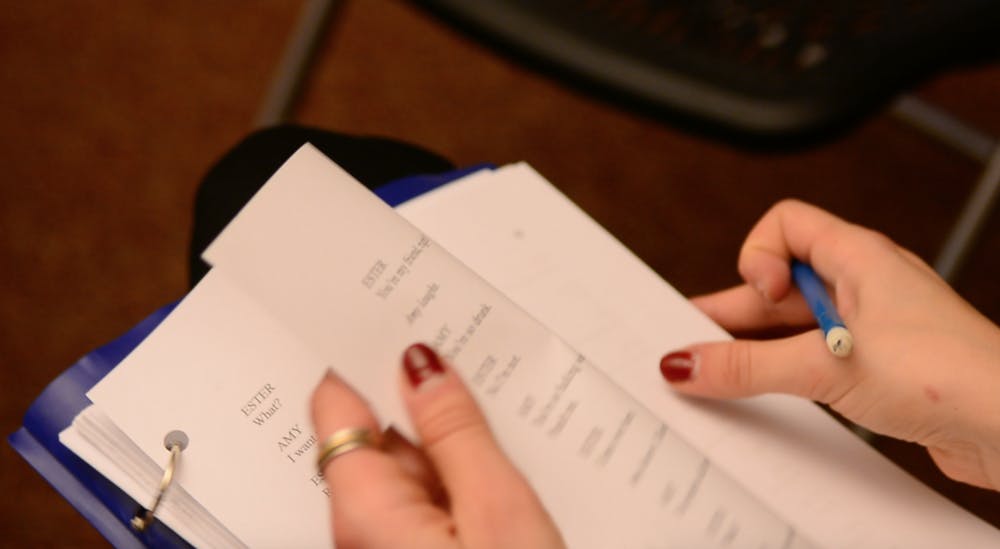
Few theatergoers have ever seen an abortion performed on stage. Come the weekend of Dec. 2, audiences at Penn will see exactly that when College junior Esther Cohen stages the drama “Dry Land” at the New College House.
First performed in New York City in 2014, “Dry Land” was written by Yale graduate Ruby Rae Spiegel while she was still in college.
Tickets will be free and available online.
Cohen said she received the script from a friend in the fall of 2015 and knew immediately that she wanted to stage it on a college campus.
Set largely in the locker room of a high school in Florida, the play explores the lives of two girls, Amy and Ester, who are on the high school swim team together. In one climactic scene, an abortion occurs on stage. Notes in the script written by Spiegel indicate that this scene should be “shown head-on.” When Cohen started preparing to stage the play earlier this year, she anticipated she might face difficulties finding resources and venues for it because of this controversial scene.
Over the summer, her application to produce the play through the Rodin Arts Collective was rejected via an email that stated, “As much as [we] believe that the play should be put on and that it has a very important message, because of the graphic nature of the content, we can’t justify putting it in Rodin.”
A representative of the Rodin Arts Collective did not respond to request for comment.
Following this rejection, Cohen did not approach other theater collectives, but decided to stage this play independently and reach out to the Penn Women’s Center for assistance in finding a venue. Through the crowd-funding platform Indiegogo, Cohen and her production team raised $3,223, exceeding their 30-day goal of $2,500 in four days.
Director of the Women’s Center Felicity Paxton said when Cohen approached the Center, they were impressed with how much thought she had invested in this project. When Cohen said that she was having difficulty securing rehearsal and performance space, Paxton reached out to colleagues in College Houses and Academic Services and received more than one offer of performance venues for Cohen to stage “Dry Land.”
“For me, what this play does which is unique is shed a spotlight on a taboo topic,” Paxton said. “It challenges the audience to grapple with the issue of abortion which is too often shrouded in shame and secrecy.”
Cohen agreed that abortion is rarely discussed frankly, but said this is also why the prospect of having to stage one is daunting.
“The fact is: This is probably going to be the first and only time that most members of that audience are ever going to see someone go through an abortion,” Cohen said. “I better strike them in the right way. I better make sure that it is true to what happens in real life.”
To prepare for the scene showing the abortion, Cohen has been reading first-hand accounts of women who have gone through medical abortions and speaking to a medical professional who specializes in obstetrics and gynecology.
Another reason that Cohen, together with “Dry Land” producer and College junior Teresa Speranza, decided to produce the play on their own rather than through an existing theater group was so that they could “do the play the way [they] wanted.”
For example, Cohen said that casting for the play was invite-only because they were particular about who they wanted to work with and the diversity of their cast. Of the five actors starring in “Dry Land,” three are from an underrepresented minority group. In addition, the entire production team for “Dry Land,” with the exception of the two male actors, is female or gender non-binary.
The play is about the nuances of female friendship and the vulnerability of having to make important decisions as a young person, Cohen said. It’s not an “abortion play.”
College sophomore Annie Fang, who plays Ester, agreed. Fang, who, like her character, also swam competitively in high school, said she was first attracted to the script because she “had not read something that captured so well, so authentically, what [young people’s] lives look like today.”
“And part of the point of this play is to show that for women who go through abortions or unwanted pregnancies, [those experiences] do not define their lives,” Fang said.
Cohen said she knows there are scenes in “Dry Land” which are provocative, but encourages students not to shy away from the play because of that.
“The best theater changes your mind,” Cohen said. “It makes you more empathetic to people unlike yourself — that’s the kind of theater I want to create.”
The Daily Pennsylvanian is an independent, student-run newspaper. Please consider making a donation to support the coverage that shapes the University. Your generosity ensures a future of strong journalism at Penn.
Donate



